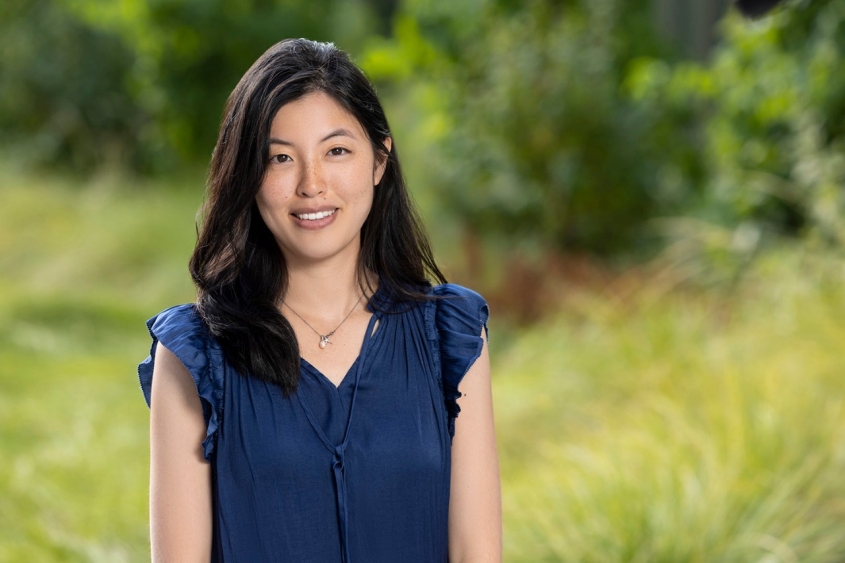Takeaway
While caring for a patient who spoke a different language than I, the medical interpreter translated more than words. She also explained cultural differences that proved invaluable.

Connecting with Patients | May 9, 2023 | 3 min read
By Adela Wu, MD, Stanford Medicine
I drew a chair to sit closer to my patient’s bed. Mr. E was propped up by two pillows that almost swallowed his cachectic frame. Three others joined us in his room: his wife, my physician attending, and a Spanish-speaking medical interpreter, Sandra. Our discussion today—our first time meeting each other—was for goals of care planning and talking with Mr. E about his hopes, values, and worries while facing a serious illness.
I was on my first week rotating with the inpatient palliative care service and knew that I had much to learn. Before we entered Mr. E’s room, my attending physician handed me a laminated card. It was a pocket-sized cheat sheet, a research-backed template for questions to ask during a serious illness conversation.
Mr. E had advanced scleroderma and had stopped working as a construction worker due to his worsening health and mounting medical appointments. He and his wife had just established care at our hospital and were trying to navigate this entirely new system.
“I’d like to talk about your illness and do some thinking together about what’s important to you so that we can give you the care you want. Is this ok?” I asked Mr. E and then waited as Sandra translated for the couple.
When Mr. E finally spoke, it was a whisper, “Sí.” His wife reached over and squeezed his hand gently.
“Thank you,” I said. “What do you understand about where you are with your illness?”
“We were getting frustrated with how my treatments were going. We came from another hospital where I didn’t like the way the doctor explained the things I needed to do next, like the heart scan,” Mr. E said.
“And I’m worried about how to get my husband feeling better. We just want him to get the right medicine,” his wife said.
I made sure to maintain eye contact with Mr. E and his wife when I asked my questions. Then we all watched the interpreter. Eyes then turned towards Mr. and Mrs. E when they spoke, and I caught snippets of Spanish. Our conversation was going well, I thought, as Sandra helped keep the meeting on track. She was the deft traffic controller, conducting the direction of our bilingual discussion, turning toward me when I spoke, and shifting her position toward Mr. and Mrs. E afterward.
I learned that Mr. E and his wife were the only ones from their family in America. Mrs. E also recently lost her job because she’d taken too much time off to be his caregiver. He had three daughters living in Mexico and he’d been looking forward to seeing his youngest child graduate. His face lit up with pride speaking about her. “She wants to become a doctor,” he said, “She’s very bright and works hard.”
However, the couple struggled with looming decisions about how to manage the various symptoms of his worsening scleroderma without a source of steady income and no way to return home without sacrificing the opportunity to get medical treatments in the U.S.
“What are your most important goals if your health worsens?” Mr. E and his wife stared blankly at each other. This was the first question that addressed a future they may not have wanted to consider yet.
Sandra finally said, “If I may, in my, and likely Mr. E’s, culture, we don’t think about goals in the way you intend. Can you give them specific examples of what you mean by goals?”
Something clicked for me, and I thanked Sandra before continuing my conversation with Mr. E. I was grateful to her for breaking from her role as medical interpreter to be a cultural interpreter, a needed translator of the underlying and the unspoken, of things I couldn’t have gleaned from a scripted card.
The language of the majority may not always work the way we assume for everyone else. When I described goals as going back to work, visiting Mexico, or seeing his family, Mr. E started nodding enthusiastically. Just as for me, a veil was lifted, and he and I now understood each other.
“Yes, yes,” he said, “More than anything, I wish to see my children. That would be the most important thing to me.”
This piece expresses the views solely of the author. It does not necessarily represent the views of any organization, including Johns Hopkins Medicine.

